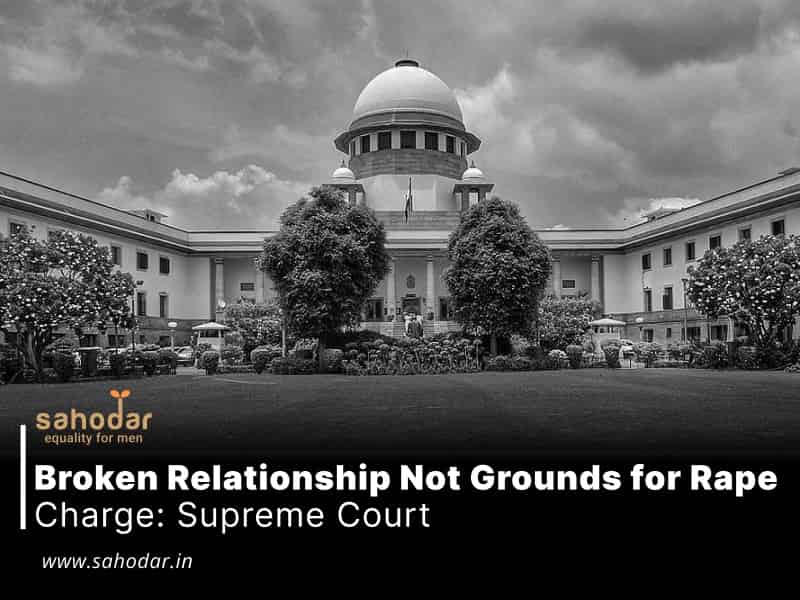The Court observed that such cases not only burdens the Courts but also brings disrepute to an individual accused of such a heinous offence.
The Supreme Court recently said that if a consensual relationship ends or turns bitter, it cannot be a reason to file a rape case against a man for making a false promise of marriage (Amol Bhagwan Nehul v. State of Maharashtra & Others).
A bench of Justice BV Nagarathna and Justice Satish Chandra Sharma said such cases not only increase the burden on courts but also harm the image of a person wrongly accused of a serious crime.
The Court also pointed out that courts should not treat every broken promise to marry as a false promise and use it to charge someone under Section 376 of the Indian Penal Code.
“A consensual relationship turning sour or partners becoming distant cannot be a ground for invoking criminal machinery of the State. Such conduct not only burdens the Courts, but blots the identity of an individual accused of such a heinous offence. This Court has time and again warned against the misuse of the provisions, and has termed it a folly to treat each breach of promise to marry as a false promise and prosecute a person for an offence under section 376 IPC,” the Court said in its judgment of May 26.
The Supreme Court was hearing a plea against a Bombay High Court order that had refused to cancel criminal proceedings against Amol Bhagwan Nehul. He had been charged under Sections 376 (rape), 376(2)(n) (repeated rape), 377 (unnatural offences), 504 (intentional insult), and 506 (criminal intimidation) of the Indian Penal Code.
The complaint alleged that Nehul, a 23-year-old student, had forced the woman into sexual relations between June 2022 and July 2023 by falsely promising to marry her.
The woman, who had been married earlier, got a Khulanama (divorce) from her husband and had been living with her 4-year-old son at her parents’ house since 2021. The man (appellant) started living as a tenant next door with three others in May 2022.
She claimed that in July 2022, he came to her house at night and said he would marry her once her divorce was final. Based on this promise, he allegedly had sexual relations with her.
Later, when the man allegedly started avoiding her, the woman went to his hometown and met his parents and relatives. According to her, his parents clearly refused the possibility of their marriage because they followed different religions.
After this, she filed a First Information Report (FIR) against him. The man then applied for anticipatory bail before the Additional Sessions Judge at Karad, which was granted.
He then approached the Bombay High Court, requesting that the criminal proceedings against him be dropped. However, the High Court refused to intervene, leading him to take the matter to the Supreme Court.
Unhappy with the High Court’s decision, the appellant sought relief from the Supreme Court.
He argued that the High Court was wrong in rejecting his plea, as the criminal case against him was a misuse of the legal process. He claimed that the allegations of forced sexual assault and unnatural sex were unlikely, especially since there was no medical evidence to support them.
He also pointed out that the FIR was filed 13 months after the alleged incident, which raises serious doubts about the truthfulness of the complainant’s claims.
The Court noted that even if the allegations in the FIR are assumed to be true, the records do not show that the complainant was forced into sexual intercourse against her will or that it happened solely based on a promise of marriage.
“The appellant and the complainant were acquainted since 08.06.2022, and she herself admits that they interacted frequently and fell in love. The complainant engaged in a physical relationship alleging that the appellant had done so without her consent, however she not only sustained her relationship for over 12 months, but continued to visit him in lodges on two separate occasions. The narrative of the complainant does not corroborate with her conduct,” the Court noted.
The Court also said there was no proof of coercion or threat to the complainant that would qualify as an offence under Section 506 of the IPC.
The complainant was upset because the appellant reduced contact with her, so she went to his village without informing him. For this reason, the Court felt that the criminal case against the appellant might have been filed with some hidden motive.
Considering that the appellant is only 25 years old and has his whole life ahead, the Court held that quashing the criminal proceedings would serve the interest of justice.
As a result, the appeal against the Bombay High Court’s order was allowed, and the criminal case against the appellant was dismissed.

